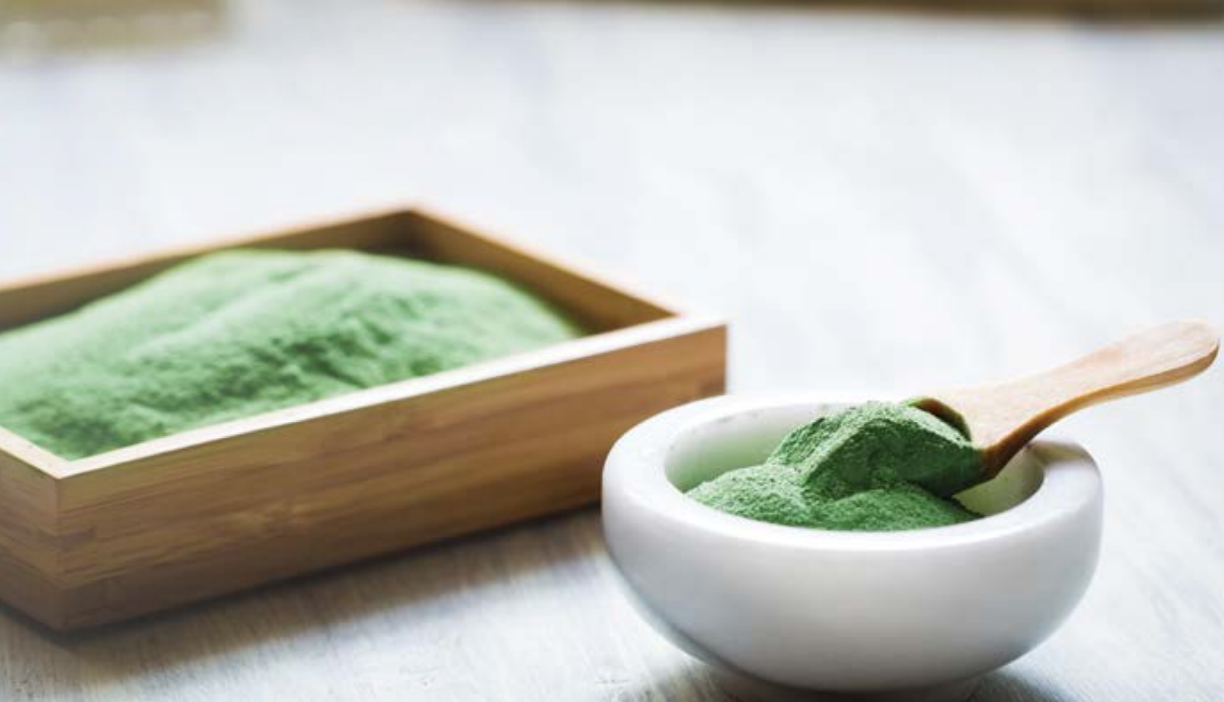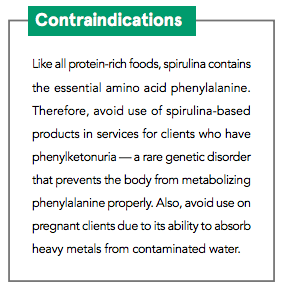Posted by Elina Fedotova February 2016 issue of Les Nouvelles Esthétiques Magazine on Apr 18th 2017
Spirulina in the Spa
Spirulina is a blue-green algae with detoxifying, calming and nourishing properties that are very beneficial for any skin type. It possesses a powerful cocktail of essential amino acids, proteins, vitamins, minerals, carotenoids, natural pigments, gamma-linolenic acid (GLA) and chlorophyll, which make it a highly versatile skin care ingredient, packed with nutritional and topical properties.
Spirulina grows in warm, alkaline fresh water and is available to skin care professionals in organic form. This microalgae flourishes in very warm water — around 86 degrees Fahrenheit — with a pH of approximately 8.5 and higher. It’s essential to find pure, organic sources of spirulina, as it it can absorb toxins and heavy metals from contaminated waters.
“ Spirulina works extremely well as an ingredient in herbal body wraps. This freshwater algae helps draw toxins out of the body.”
Nutritional Benefits
Spirulina is a whole food source that contains a synergetic blend of nutrients beneficial to the entire body. It’s actually considered a valuable food source in several countries. According to Joseph Mercola, D.O., spirulina is primarily known as a nutritional supplement
This fresh water algae has so many nutrients that NASA and The European Space Agency researched it in the late 1980s and early 1990s as a main source of food for astronauts that could be grown during long space flights. Spirulina is a wonderful provision of amino acids, beta-carotene and antioxidants, which makes it a valuable supplement for skin health.
Beta Carotene is a form of vitamin A that is abundant in spirulina. Vitamin A is among the most famous vitamins for beauty, and has the ability to restore the skin on the cellular level. It also acts as an antioxidant to help protect cells from the damaging effects of harmful free radicals.
Superoxide Dismutase (SOD) is a powerful antioxidant that helps to oxygenate and detoxify the tissue and protect the skin.
Gamma Linolenic Acid (GLA) is a highly polyunsaturated fatty acid that contributes to the elasticity of the skin.

Amino Acids
Spirulina is known for its rich protein content. This microalgae contains all of the essential amino acids — the building blocks of protein — and 10 of the 12 non-essential amino acids. Studies show that the protein in spirulina is very easy for the body to digest. Amino acids found in spirulina that are particularly beneficial to the skin include:
LYSINE: This key essential amino acid helps stimulate the immune system and the healing processes of the skin and entire body. It can be taken orally and is used in topical skin care preparations to accelerate the healing of cold sores (herpes outbreaks) and other inflammatory conditions.
GLYCINE AND PROLINE: These non-essential amino acids comprise two out of four major structural components of collagen. Glycine also helps energize and oxygenate skin cells.
ALANINE: This non-essential amino acid helps improve the body’s microcirculation, boosts the process of simple sugar conversion into energy and assists in the elimination of toxins from the liver. It’s used in a wide variety of skin care formulations.
METHIONINE: This essential amino acid is required for the production of glutathione, one of the body’s most important antioxidants.
Topical Benefits
1. Oily/acne-prone skin: Spirulina helps to alkalize and detoxify congested complexions, making it very beneficial for treating oily and acne prone skin.
2. Anti-inflammatory: It also has wonderful cooling, calming and healing effects on inflammatory conditions like rosacea.
3. Cleanse and strengthen: The chlorophyll contained in this algae helps cleanse, oxygenate and strengthen skin. It’s great for sensitive complexions because it produces a gentle anti-histamine effect while deeply nourishing the skin with a powerful complex of phytonutrients.
4. Dry/aging skin: Spirulina’s synergetic blend of proteins, antioxidants and vitamins, combined with gentle moisturizing properties, helps to restore dry and wrinkled areas of the skin.
5. Anti-aging: Spirulina helps fight three major causes of aging skin — inflammation, oxidative stress and glycation.
The high content of chlorophyll and other healing nutrients contained in this algae help calm inflamed skin. The high antioxidant content helps reduce oxidative stress and protect skin cells from free radical damage. When ingested, it helps control the body’s glucose level, which assists in reducing glycation, a molecular mechanism in the body that can lead to premature aging.
6. Calming: A natural spirulina-based mask applied following microdermabrasion or other exfoliating treatments is soothing.
7. Treatment booster: Applying a spirulina based mask to your client’s face before using galvanic or ultrasonic equipment allows for deeper penetration into the skin.
Spirulina in the Spa
With all of the beneficial properties and benefits of spirulina, it has many applications in the spa:
— It can be used in many formulations for cleansing, healing and skin nourishing effects, and can enhance almost any skin care product, including makeup!
— Spirulina can even be used as a bright green pigment in place of synthetic dyes.
— Alkalizing and oxygenating properties make it an ideal ingredient for post-acid peel treatments.
— Due to its high concentration of chlorophyll and antioxidants like phycocyanin and N-acetylcysteine, spirulina works extremely well as an ingredient in herbal body wraps. This freshwater algae helps draw toxins out of the body.
Spirulina is a highly beneficial ingredient that works well when combined with other formulations or used alone with other active ingredients. This blue-green algae makes a complete balanced meal for the skin all by itself!

-Elina Fedotova is the formulator and CEO of Elina Organics, an award winning cosmetic chemist and aesthetician. She hand makes her professional skin care line in her laboratory using holistic principles and organic ingredients from around the world. In 2007, she founded the Association of Holistic Skin Care Practitioners (AHSCP); a nonprofit organization that provides ongoing training and education for professionals.-

